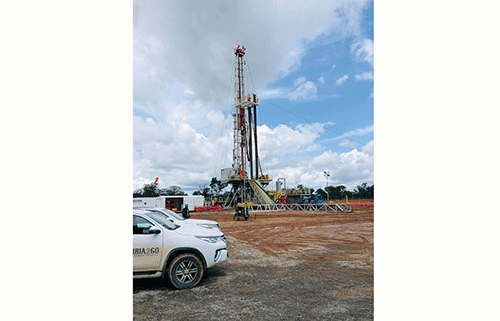Reconnaissance Energy Namibia is adamant that it has been granted consent by the Shambyu Traditional Authority to enter and undertake exploration operations as required by the petroleum exploration licence granted to the company by government.
This is according to a statement the company issued yesterday in response to an article in The Namibian titled ‘ReconAfrica operated without land certificate’. The article alleges that while the Canadian oil explorer only received the right to lease the land in September, it has actually been drilling since January this year.
In yesterday’s statement, Reconnaissance Energy Namibia Pty Ltd stated it is the holder of the Petroleum Exploration Licence No. 73 issued in terms of Section 34 of the Petroleum (Exploration and Production) Act 2 of 1991, which licence area covers both Kawe and Mbambi locations. The statement further stipulates that in terms of Section 29 (1) of the Petroleum (Exploration and Production) Act 2 of 1991, Reconnaissance Energy Namibia Pty Ltd as the holder of an exploration licence has the exclusive right to conduct exploration activities in the licence area, which covers both Kawe and Mbambi locations.
“In terms of the petroleum agreement between ReconAfrica and the Namibian government, the initial exploration period, among other obligations, requires Reconnaissance Energy Namibia to drill stratigraphic wells,” reads the statement from ReconAfrica spokesperson, Ndapewoshali Shapwanale.
ReconAfrica also pointed out that the Petroleum (Exploration and Production) Act 2 of 1991 recognises that for the holder of the exploration license to conduct the required work obligations, they may enter the land of any person or land in the custody of the traditional authority to carry out the exploration operations stipulated in the licence. This, they said, is spelt out in Section 54 of the Act, which states: “The provisions of this part, in so far as they provide for a limitation on the fundamental rights contemplated in sub article (1) of Article 16 of the Namibian Constitution in order to authorise, subject to an obligation to pay just compensation, the holder of a licence to enter upon any land of any person for purposes of carrying on operations authorised by such licence, are enacted upon the authority conferred by sub article (2) of that Article.”
Given these provisions, Reconnaissance Energy Namibia Pty Ltd stated that, together with the Shambyu Traditional Authority covering the Kawe and Mbambi locations, they identified the sites for drilling the
wells.
“These two sites had not been allocated to anyone and the traditional authority as the custodian of communal land then granted the company consent to enter the two locations and carry out the drilling operations in order to satisfy the requirement of Section 36 and 54 of Petroleum (Exploration and Production Act 2 of 1991. Therefore, the drilling of the wells was done in accordance with the law and access to the locations was consented to by the traditional authority,” ReconAfrica stated.
In terms of the Communal Land Reform Act, an application is submitted to the relevant traditional authority when applying for a customary land right. If approved, the application is sent to the Communal Land Board for approval.
ReconAfrica has dealt with a host of allegations since it commenced with exploration activities in Namibia, including that it apparently disposed of wastewater without permits and that it ignored local concerns about the impact of exploration and drilling on water supplies.
In addition, ReconAfrica has been accused of telling government officials and the public that it won’t use fracking, while National Geographic reported that its investor presentations indicated that if commercial quantities of oil and gas are confirmed, it planned to use fracking to extract at least some of it.
Fracking is a controversial practice in which underground shale is injected with high-pressure fluid to crack open rock to release oil and gas. This activity requires large amounts of water and has been known to cause earthquakes, pollute water, release greenhouse gases, and lead to birth defects in people and animals, among other problems.
Investors in the USA on 25 October filed a lawsuit against the company for operating a “fraudulent scheme” in the two Kavango regions.


